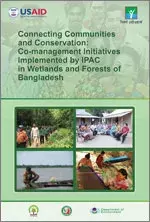Error message

One of the poorest and most densely populated nations in the world, Bangladesh is also arguably the most vulnerable to the negative impacts of climate change. Increased salinity of soils in coastal regions as well as increased incidence and severity of cyclones and other natural disasters lend credence to the argument that the impacts of climate change are already here. Thus, Bangladesh must struggle in its efforts toward poverty alleviation and food security, and build a foundation of resilience to ensure gains made today can be sustained into the future. Increasingly, Bangladesh government officials and civil society recognize the importance of a healthy and integrated protected area system as a fundamental building block in its foundation of resilience. An integrated protected area system ensures that forests and wetlands are managed to conserve and sustain key environmental services--especially the provision of a stable supply of water--into the future. Based on the principles of co-management, government and communities are working together to ensure conservation of existing protected areas, to demonstrate the development benefits of conservation of protected areas, and to expand this network in size and complexity through the Nishorgo Network.
This book is a contribution to strengthening co-management of Bangladesh's protected area system. Papers in this volume are based on research funded as part of the Nishorgo Network's Integrated Protected Area Co-Management (IPAC) program. Research funds were allotted to government officers from various departments, as well as to one research fellow from Bangladesh University of Engineering and Technology (BUET), to support site-specific research pertaining to issues of co-management initiatives implemented by IPAC in wetlands and forests of Bangladesh. It is expected that the research findings reported in this book will illuminate new directions for policy and implementation strategies for creating arrangements that meet the goals of co-management through participation and governance, livelihoods and resources. Spending time to investigate the realities of local resource users in both wetland and forest environments will help in tailoring comanagement initiatives launched in association with the Government of Bangladesh and the United States Agency for International Development (USAID), and with the formal involvement of local communities.
The IPAC project is a five-year USAID contract working with the government and people of Bangladesh to establish a robust national protected area system based on the principle of co-management. IPAC is implemented through a consortium of partners led by International Resources Group (IRG) and including the international organizations East-West Center, WorldFish, and WWF-US, as well as leading Bangladesh NGOs BELA, CODEC, and CNRS. Components of the program have been designed to meet the needs of co-management arrangements at national, regional, and local levels. These include policy development, institutional capacity building, and support for site-specific implementation.
One of the poorest and most densely populated nations in the world, Bangladesh is also arguably the most vulnerable to the negative impacts of climate change. Increased salinity of soils in coastal regions as well as increased incidence and severity of cyclones and other natural disasters lend credence to the argument that the impacts of climate change are already here. Thus, Bangladesh must struggle in its efforts toward poverty alleviation and food security, and build a foundation of resilience to ensure gains made today can be sustained into the future. Increasingly, Bangladesh government officials and civil society recognize the importance of a healthy and integrated protected area system as a fundamental building block in its foundation of resilience. An integrated protected area system ensures that forests and wetlands are managed to conserve and sustain key environmental services--especially the provision of a stable supply of water--into the future. Based on the principles of co-management, government and communities are working together to ensure conservation of existing protected areas, to demonstrate the development benefits of conservation of protected areas, and to expand this network in size and complexity through the Nishorgo Network.
This book is a contribution to strengthening co-management of Bangladesh's protected area system. Papers in this volume are based on research funded as part of the Nishorgo Network's Integrated Protected Area Co-Management (IPAC) program. Research funds were allotted to government officers from various departments, as well as to one research fellow from Bangladesh University of Engineering and Technology (BUET), to support site-specific research pertaining to issues of co-management initiatives implemented by IPAC in wetlands and forests of Bangladesh. It is expected that the research findings reported in this book will illuminate new directions for policy and implementation strategies for creating arrangements that meet the goals of co-management through participation and governance, livelihoods and resources. Spending time to investigate the realities of local resource users in both wetland and forest environments will help in tailoring comanagement initiatives launched in association with the Government of Bangladesh and the United States Agency for International Development (USAID), and with the formal involvement of local communities.
The IPAC project is a five-year USAID contract working with the government and people of Bangladesh to establish a robust national protected area system based on the principle of co-management. IPAC is implemented through a consortium of partners led by International Resources Group (IRG) and including the international organizations East-West Center, WorldFish, and WWF-US, as well as leading Bangladesh NGOs BELA, CODEC, and CNRS. Components of the program have been designed to meet the needs of co-management arrangements at national, regional, and local levels. These include policy development, institutional capacity building, and support for site-specific implementation.




